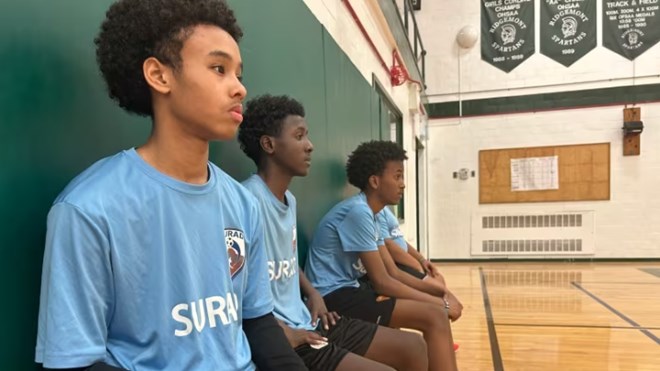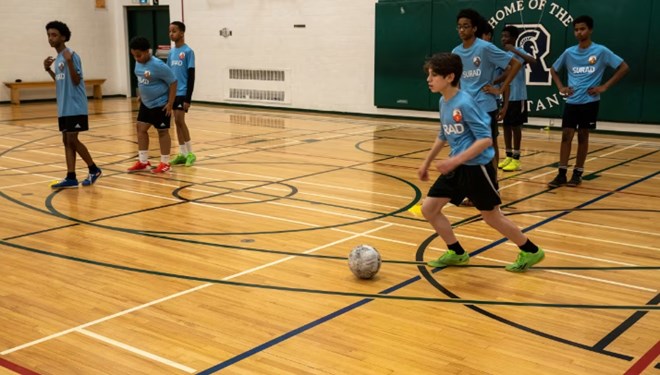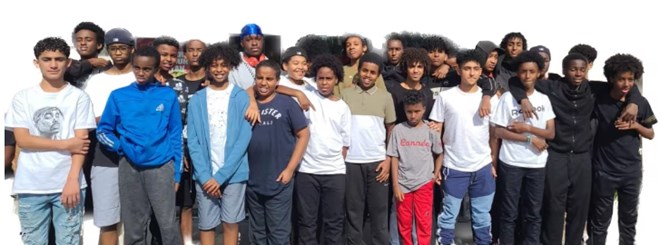
Guy Quenneville · CBC News
Tuesday January 24, 2023

Players from Surad, a local Somali soccer group whose members play on Ottawa Futsal Club teams, watch their teammates during a practice in Ottawa on Jan. 20, 2023. (Guy Quenneville/CBC)
A frustrating struggle between a local Somali soccer group and the eastern Ontario soccer association has left dozens of young soccer players on the sidelines because of miscommunication and alleged discrimination, those involved say.
The group called Surad — named after the tall Somali mountain peak featured on their jerseys — was launched a decade ago out of the gymnasium at Ridgemont High School.
it works to plug newcomer families into the mainstream soccer world, give players the ability to develop competitively, and act as a support network, according to co-founder and parent Said Arwo.
Most Surad players are Black and Muslim with families from Somalia. Other members' parents come from Iraq, Syria, Yemen and other immigrant communities, according to Arwo.
"We're bringing players whose parents are not going to fork out $2,000 or $3,000 so their child can join one of these big clubs," said Abdirizak Mohamud, another Surad co-founder and parent.
These players compete within the Eastern Ontario District Soccer Association (EODSA), which governs competitive youth soccer from Hawkesbury to Deep River. Surad has partnered with "sanctioned" association clubs, more recently Ottawa Futsal Club, for the last seven years — playing under those clubs' names, Arwo said.
Surad players must also wear the jerseys from their partner club during games, Arwo said, which don't include the group's logo.
That's a disappointment to the group and its players. The Surad mountain crest, worn during practices, is an important cultural signifier.
"We have to have something they can call their own," Arwo said.
Surad captain Hamza Hassan, 14, said the logo has become part of his identity.
"It means a family to me," he said.
EODSA's positions on jerseys, as well as other policies, have had a major effect on the group over the past year, Arwo said, with Mohamud calling the policies "heavy-handed."
"They used the rules to discriminate [against] a particular group, a particular ethnicity and particular players that share the same common background," Arwo alleged of EODSA.
EODSA President Keith Penny denies his organization sought to discriminate while applying rules.
"We certainly are not in the business of denying people their distinctiveness," he said.

Surad players practise on Jan. 20, 2023, in the gymnasium at Ridgemont High School, which is where Surad first recruited players a decade ago. (David Bates/CBC)
The jersey rule
Last spring Arwo asked the association's board of directors to rethink the EODSA's jersey rule in a letter that alleges "deeply-embedded societal norms that favour assimilation rather than integration."
Arwo said he never received a reply, while Penny said EODSA typically deals with clubs, not players or families, adding Surad is not an official member of the association.
Mick Fitzgerald, the chair of the board of the Ottawa Futsal Club, argues players should be able to wear Surad branding when playing for his club because other teams can wear sponsorship branding.
Penny, though, said the rule prevents confusion among other teams about who they're playing, and some groups use patches to subtly recruit players.
"It's just far easier to have a simple rule … and make it universal for everyone," he said.
Team promotions in jeopardy
The disagreement between Surad and EODSA extends beyond the logo.
That came to a head this fall when two teams with Surad players — including one featuring Arwo's 14-year-old son — won their district age divisions.
Normally, those teams could be promoted to a more competitive division in the summer of 2023, but EODSA informed the group they would neither be promoted nor be eligible to play this winter and next summer, according to Arwo and Fitzgerald.
The EODSA, they said, pointed to an August 2022 bulletin from Ontario Soccer, the governing body, that stated players could not promote a soccer group other than their club, and clubs could not register "non-sanctioned organization (i.e. academies) teams for the sole purpose of allowing them access to … sanctioned competition."
Arwo said the news Surad players couldn't play left them confused.
"It was hard for me to stand in front of those players," he said.
'We felt powerless'
Behind the scenes, a flurry of emails, including some obtained by CBC, flew around between organizations involved.
One email from OFC General Manager Karl Gray accused soccer organizations of not being able to "accept that immigrant children are just as good or better [than] the locals," and alleged they were "willing [to] find some distorted excuse to exclude them from further participation in the Canadian soccer community?"
Vicki Lowe, EODSA's executive director, also sent an email accusing Surad of starting as a cultural group "but [turning] into more of an academy — paying for training separately."
She said EODSA wanted Surad involved in the association but they needed to be "fully integrated" into OFC.
Arwo said Surad had not worn its jerseys since August 2019 and did "everything in our power to follow all the conditions."
"We felt powerless."

The two Surad teams, with players aged 14 and 16 who each won their district age division this past summer, pose for a group shot. (Submitted by Said Arwo)
Association says it tried to keep kids playing
After some follow-up meetings, Surad's website — which Arwo says has been defunct for years — appeared to be at the heart of concern about the group's activities and goals.
Penny said the Surad website suggested the group was involved in a house league that wasn't registered with the EODSA and teams playing outside the system don't contribute to coach training and referee training.
Safety within unsanctioned activities was also top of mind, Lowe added, adding that no safety concerns about Surad were raised.
In retrospect, Penny admitted Surad parents should have been involved earlier in meetings between the organization and OFC, though he cited "miscommunication" by OFC as a factor in the situation spiralling.
'Not a victory for inclusiveness'
Surad contacted Ottawa city councillor Rawlson King, who linked the group with United for All, a coalition denouncing hate and racism in eastern Ontario, and asked it to help foster a resolution.
Six days before Christmas and already several weeks into the winter playing season, Abid Jan of United for All said a meeting, which also involved Robin Browne of local advocacy group 613-819 Black Hub, took place and an agreement was immediately reached.
The two OFC teams would be promoted in the summer of 2023 — provided Surad shuttered or modified its website, coaches kept up with training, and the group stated in writing it was not a soccer club.
The OFC uniforms had to stay on, too — a compromise needed to get Surad players back on the field but "not a victory for inclusiveness," said Arwo.
Still, the young soccer players — bystanders in the back-and-forth — missed out on the winter season because it was already past the registration deadline. Some players left Surad because of it, Arwo said.
Communication issues on both sides: mediator
Jan said the impasse revealed misunderstandings on both sides.
"One side needed to understand the EODSA rules clearly, and the other [become] more aware of the issues such as the problems they were facing with the website," he said.
Despite the resolution, Surad remains hurt by decisions at EODSA, which says it was applying Ontario Soccer rules. (CBC has reached out to that body too.)
"[The hurt] doesn't have to be deliberate," said co-founder Mohamud of EODSA. "It's usually a byproduct of some procedures or the way they've done things in the past."
Fitzgerald of OFC added that EODSA's actions are "systemically discriminatory."
EODSA said it stands against racism, and continues to try to open up leagues to smaller groups.
"There are underprivileged kids out there that we know aren't able to access soccer because they can't pay the basic fees of a club and so they don't even try," Lowe said.
Recognizing that, the association is undergoing a governance and membership review, one started before the events of 2022, Lowe said.
"We can't take in new members right now because there's no geographical space," she said. "So we need to be able to figure out how to get those new members in … Surad is an example of the type of work that we're trying to do."
Penny said the association is also planning a district-wide house league that would "greatly help smaller clubs attract new players that can't afford to play competitive soccer."
Arwo said Surad wants a formal apology from EODSA and that the partial resolution should not have required outside intervention. He said he wants to hold the association "accountable."
"If somebody's doing harm and the harm stopped, it doesn't mean it hasn't happened."